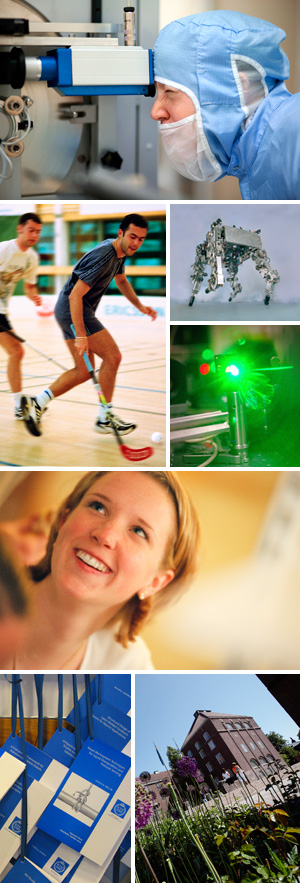KTH:s blogg-tjänst är ett verktyg som möjliggör för KTH:s verksamheter att snabbt och enkelt förmedla löpande information på webben och via kommentars- och delningsfunktioner få återkoppling på innehållet. Blogg-tjänsten är avsedd för funktioner på KTH som vill kunna belysa den egna verksamheten i flödesform och förmedla aktuella händelser, såsom ett mer dynamiskt komplement till information i KTH:s övriga webbmiljöer.
Hittar du som besökare innehåll på någon av KTH:s bloggar som du bedömer som otillåtet vänligen inrapportera detta till abuse@kth.se med angivelse av webbadress för den aktuella sidan. Avser din anmälan kommentar till blogginlägg använd formuläret som nås från länken ”Anmäl” i anslutning till kommentaren.
Önskar du som KTH-anställd starta en blogg kontakta it-support@kth.se. Läs dock igenom informationen nedan först.
Ansvarsroller
Blogg-tjänsten tillhandahålls endast för användande inom ramen för KTH:s verksamhet. Bloggarna är likställda med officiella webbsidor och har myndigheten KTH som avsändare. Tjänsten får därmed inte användas för så kallade personliga webbsidor eller privata ändamål.
Innehållet i webbsidor på KTH regleras av föreskriften Universitetsgemensam rutin för KTH:s närvaro i webbaserade kanaler (pdf 295 kB).
Vid upprättande av ny blogg på KTH utser eller godkänner ansvarig chef sidansvariga för bloggen, det vill sägas den eller de personer som för KTH:s räkning tryggar att bloggen uppfyller sitt syfte och att publicering sker i enlighet med lagar och riktlinjer. Detta ansvar kan inte delegeras till icke-anställda personer som publicerar sig via bloggen.
På bloggen ska det framgå vilken organisationsenhet som är ansvarig för innehållet.
Den centrala förvaltningsgruppen för KTH:s webbplats gör stickprovskontroller av innehållet på bloggarna.
Syfte
Bloggar på KTH ska i huvudsak beskriva verksamhet på KTH. Vilken verksamhet som bloggen belyser ska framgå av den beskrivning som nedtecknas i samband med upprättandet av bloggen. Den centrala förvaltningsgruppen bevakar inom ramen för stickprovskontroller att innehållet i bloggen motsvarar syftet.
Student- och alumnibloggar
Studenter som bloggar på KTH är gästskribenter. Syftet är att läsaren ska lära känna några av KTH:s studenter och få insyn i deras vardag. Bloggarna kan därför delvis vara mycket personliga. De åsikter som framförs i blogginlägg eller kommentarer delas inte nödvändigtvis av KTH. KTH ansvarar heller inte för faktauppgifter i inlägg eller kommentarer.
Kommentarfunktion
Blogg-tjänsten medger användargenererat innehåll via kommentarfunktion. Detta är förenat med omständigheter som kräver extra vaksamhet.
För att trygga att otillbörlig information inte publiceras har KTH en långtgående uppsiktsskyldighet över webbmiljöer som tillåter utomstående part att publicera innehåll. Kraven på innehållet i kommentarer är de samma som för övrig publicering på KTH:s webbplatser. Se föreskrifterna inlänkade ovan.
Publicering av kommentarer kan antingen ske direkt eller via förhandsmoderering, det vill säga blogginnehavaren måste först godkänna kommentarer innan de publiceras.
Det åligger blogginnehavare som inte kan trygga daglig uppsikt av inkomna kommentarer att tillämpa förhandsmoderering eller avaktivera kommentarfunktionen helt. Observera att även förhandsmoderering kräver uppsikt och enligt god sed skyndsam hantering.
Inom ramen för KTH:s serviceskyldighet måste kommentarer som kräver vidare hantering vidareförmedlas till relevant KTH-funktion, där bedömning också görs om innehållet ska diarieföras. Vidare är kommentarer att anse som allmänna handlingar och ska därför alltid vara tillgängliga för ett utlämnande. Blogginnehavaren bör därför inte radera inkomna kommentarer, oavsett om dessa inte publiceras på bloggen eller inte föranleder vidarebefordran till annan instans.
Publicerad kommentar med innehåll som strider mot punkterna under rubriken ”Otillåtet innehåll” ska bevaras innan den raderas från bloggen. KTH är skyldigt att föra olaglig information vidare till polis eller annan myndighet. Lämplig åtgärd för bevarande av olämpligt innehåll är att anmäla innehållet via anmälningsfunktionen (se rubrik ”Anmälan”) och att spara ned en så kallad skärmdump av innehållet innan det avlägsnas. Vid osäkerhet kring detta kontakta abuse@kth.se.
I enlighet med lagen om elektroniska anslagstavlor informeras besökare som lämnar kommentar i blogg om att insända meddelanden kommer att göras tillgängliga för andra besökare.
Anmälan
I anslutning till inlägg och kommentarer på KTH:s bloggar finns en anmälningsknapp som leder till ett formulär där besökaren kan rapportera in olämpligt innehåll. Ifyllda formulär skickas till IT-avdelningens säkerhetsgrupp för vidare hantering. Av formuläret framgår vilken sida anmälan avser. Såväl blogginnehavare som besökare uppmanas att anmäla material som bryter mot lag via denna anmälningsfunktion.
Drift och underhåll
Blogg-tjänsten använder blogg- och innehållshanteringssystemet WordPress. KTH:s centrala webbförvaltningsgrupp förvaltar tjänsten och säkerställer drift och funktion.
Om kommentarer på KTH
Text som beskriver vad som gäller kommentarer/kommentering på KTH:s bloggtjänst…
Denna sida kommer länkas in från respektive inlägg/sida där kommentarer är påslagna.
Genom kommentarsfunktionen kan du ge respons på blogginnehållet. Tänk på att det är du som publicerar kommentarer som ansvarar för innehållet.
Genom att använda kommentarsfunktionen förbinder du dig
- Att endast publicera kommentarer som är relevanta med avseende på bloggens innehåll
- Att använda ett sakligt och vårdat språk
- Att inte publicera kommentarer som bryter mot lagar eller KTH:s föreskrifter eller som innehåller internetadresser till sådant innehåll
- Att inte publicera kommentarer som innehåller personangrepp eller kan vara till skada för enskild person
- Att inte publicera samma kommentar flera gånger eller på liknande sätt störa eller sabotera diskussionen
Blogginnehavaren håller kontinuerlig uppsikt över publicerade kommentarer och tar bort kommentarer som bedöms bryta mot ovanstående punkter.
Kommentarer utgör allmänna handlingar inkomna till myndigheten KTH och kan därför begäras ut av tredje part.
Kommentarer kan komma att raderas (gallras) sedan en viss tid förflutit efter publicering.
Eventuell porträttbild i anslutning till publicerad kommentar är hämtad från antingen avsändarens profilbild på www.gravatar.com eller i de fall avsändaren är inloggad som KTH-användare från dennes profilsida på KTH:s webbplats.

